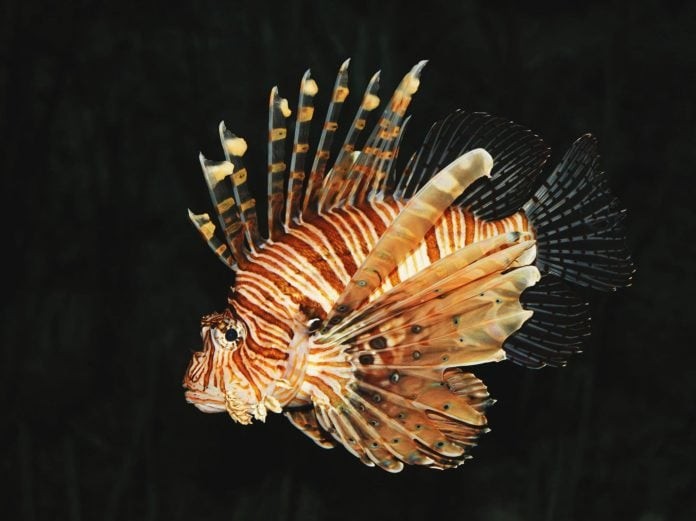Lionfish: A joy to see in their native waters of the Indo-Pacific, a terror in the waters of the Caribbean. This beautiful even majestic fish is wondrous in its home waters. They are seldom seen in any number greater than two or three on a dive site. They gracefully and slowly move around in their small territory of land. In the waters of the Gulf of Mexico and in the Caribbean Sea they are not welcomed. However, these invaders are found in the millions and are taking over the waters. They will eat anything they can fit in their mouths. Populations of entire species are dropping to a level where they are no longer sustainable. As a result, the price of many types of fish is sky-rocketing. Florida has been severely impacted and as I discussed in an earlier article that state has declared war on Lionfish. Recently, the lionfish has appeared in the Mediterranean Sea, which now faces the same type of invasion. There has been a great deal of effort and millions spent trying to counter the presence of these invaders. The question is, how effective have the efforts been.
Recent news, in addition to the findings in the Mediterranean, has not been all positive. Reports of massive numbers of lionfish at depths below recreational diving limits and findings of them in the waters off the Mid-Atlantic coast of the United States have shown that human’s are losing the battles. But what about the war?
Who Is Winning the Lionfish War?
This is a question I asked a number of people and organizations while I visited different booths at the DEMA Show last month. The answers tended to point to the lionfish winning with the environment even mankind being on the losing end. There are coral reefs where the native fish have all but disappeared. These native fish are important to feed a good portion of the world’s population. Fisherman in some areas are seeing catches so small they can not feed their families. The lionfish are seldom caught using traditional fishing methods. So while they are plentiful, they are not helping to feed the families.
While the overall picture does not look good, there are so bright points. The dive operators in the Grand Cayman’s in cooperation with the local government have turned the tide against the lionfish in many areas. They each dedicate a day to remove lionfish at different reefs. This concentrated effort has brought the numbers down to the point that the native fish are living long enough to become bigger than the lionfish can eat. That itself is a feat as the lionfish has the ability to stretch its mouth and stomach to eat larger fish.
The lionfish is not currently entrenched in the waters around Belize and Honduras. There are divers who are slowing down the invasion by removing as many as they can.
Eat Lionfish
Between seminars at the DEMA show, I was in line to buy a snack. The man in front of me was talking with another person raving about a lionfish dip he just purchased. I asked where he found the dip and he said it was at the booth of the Lion Fish University. Lionfish university is one of the organizations in the war against the lionfish. Their efforts are centered on Pensacola Florida. Later, I stopped by their booth and we talked about ongoing efforts to beat the lionfish. Of course, I was snacking on the dip at the time. One of the efforts ongoing by many of the organizations is to make lionfish a commercially valuable species. Since they are currently only captured by spearing, it is labor intensive to gather them. The approach being used is two prong, first to create a market for the fish gather by divers strong enough to make the effort financially worthwhile. Second is to develop tools that would not require a diver in the water to harvest the fish. In the areas where lionfish are present, many restaurants are using lionfish in recipes that were formerly used for fish such as snapper or group. The rising cost of those two species and the similar texture of lionfish to them makes this a sound move on the chef’s part. Scientists at NOAA and other organizations are experimenting with different designs of traps to catch them while not removing other marine life. Some the approaches are high-tech, such as a trap that will take a number of photograph images of a fish when it enters the trap. Imaging software compares the images with a database of images to determine if it is a lionfish. If it is not, the trap opens to release the captured fish. One simpler trap has had very good initial success. The trap uses the natural tendencies of the lionfish against itself. It sits flat on the sandy bottom where lionfish are. The trap is left alone for a number of weeks, then pulled to the surface. As the trap is pulled, the sides come up closing the trap. The lionfish are slow to respond by nature and are kept in the trap. Other species will react to the motion and leave. Juvenile fish are able to swim out of the trap at any time. Initial tests show an almost 100% trap usage if the trip is left alone for a month. Depending on the density of the lionfish more than one may be captured. Innovations such as these traps will reduce the labor need to bring in large numbers of lionfish and give the native fish a chance to recover.
The efforts to create a market is showing signs of initial success beyond the restaurants. A couple distributors and a few grocery store chains have taken on the task with good results. The Wegman’s grocery store chain in the northeast US has introduced lionfish in a number of stores. The seafood manager I talked to in my local area said they have weekly standing orders that sell out the vast majority of their shipments. Food such as the lionfish dip are by Edible Invaders

Getting Involved
Reef Org is the spearhead organization in this war working closely with other organizations and governments. They have an excellent educational system and sponsors a number of lionfish derbies each year. They conduct seminars on different topics and have one coming up soon on using the spines of the lionfish to create jewelry.
Check out these organizations, see if anyone in your area sells lionfish meat and lets take a bite out of this problem.


